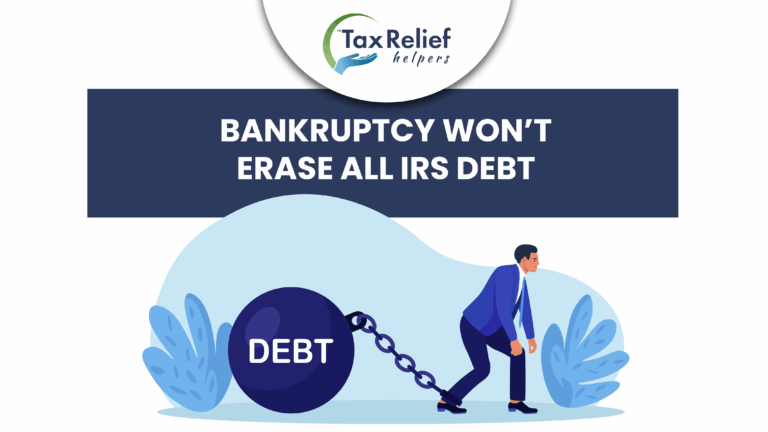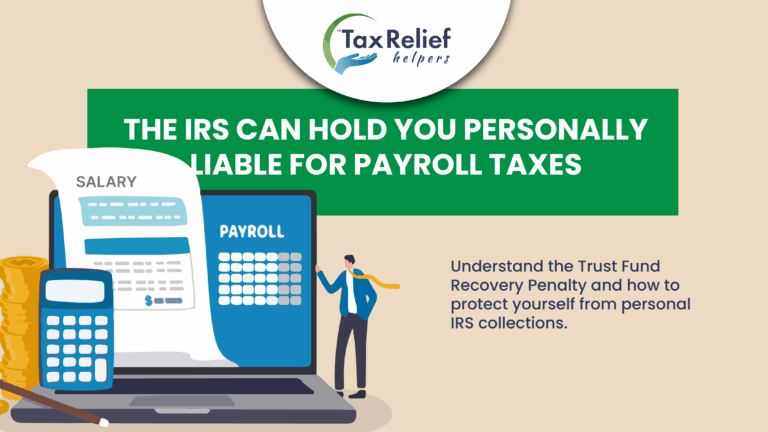Kentucky Tax Relief Services for Individuals and Businesses
Kentucky’s tax laws can feel straightforward on paper—but in practice, navigating the state’s income tax, sales tax, property assessments, and inheritance rules often leads to confusion, delays, and costly penalties. If you’ve received a notice from the Kentucky Department of Revenue, are waiting on a refund, or feel overwhelmed by tax debt, you’re not alone.
At Tax Relief Helpers, we provide expert support for Kentuckians dealing with audits, collections, and other tax-related stressors. Whether you’re based in Louisville, Lexington, or a smaller town, we bring the experience and legal resources needed to help you find real relief.
How Kentucky Taxes Work—and Where People Get Stuck
Understanding the basics is important, but knowing how to handle unexpected tax problems is where real relief begins.
Key Kentucky Tax Details
Flat Income Tax Rate
- Kentucky imposes a 4% flat tax rate on personal income.
- The rate applies to all filers, regardless of income bracket or filing status.
- Adjustments to taxable income may be required compared to your federal return, contributing to some confusion.
- Some state-specific deductions and exclusions are allowed, but they are more limited than federal ones.
Sales Tax
- Statewide sales tax rate: 6%
- No local sales taxes, so the 6% applies everywhere in Kentucky.
- The flat rate has a noticeable effect on daily purchases, especially large expenses.
Property Taxes
- Collected at the county or city level; rates differ based on location.
- There is a small state property tax (10.9 cents per $100 value as of 2024).
- Exemptions for seniors and low-income homeowners are available, but rules vary by jurisdiction.
Inheritance Tax
- Kentucky has an inheritance tax—one of the few states to do so.
- Immediate family members (spouses, children, parents, siblings, grandchildren) are fully exempt.
- Other recipients (nieces, nephews, friends, unrelated individuals) pay tax above certain exemption thresholds, with rates from 4% to 16% depending on the amount inherited.
Refund Delays
- Refunds often take longer than expected:
- E-filed returns: 2–3 weeks (if using direct deposit)
- Paper returns: can take up to 8–12 weeks
- Online refund tracking tools are available from the Kentucky Department of Revenue, but users may find them unclear in complicated situations.
What We Can Help You With
Tax Relief Helpers works with Kentucky taxpayers to resolve a wide range of state and IRS issues, including:
- Income tax debt and resolution plans
- Sales tax problems for small businesses
- Disputes over refund amounts or delays
- Penalty and interest reduction
- Defense in audits or appeals
- Inheritance and property tax questions
- Legal representation by licensed Kentucky tax relief attorneys
- Tax planning to prevent future issues
qualified employees
fighting to lower your tax debt
of tax resolution experience-
our founders are experts
Millions of dollars
in tax debt reduction negotiation every year
Discover Peace of Mind with Tax Resolution
Our primary goal is to bring you peace of mind and financial stability. We are committed to negotiating with tax authorities on your behalf, seeking resolutions such as installment agreements, offers in compromise, or penalty abatements that best suit your financial situation.
Recognizing the stress and burden that tax debt can bring, our firm ensures a compassionate, confidential, and diligent service. With our guidance, many Californians have successfully navigated their way out of tax debt, and we are here to help you do the same.
Begin your journey towards financial relief today and take the first step in resolving your tax challenges with confidence.

I highly recommend their services...

FAQ
Does Kentucky have a state income tax?
Yes, Kentucky imposes a flat 4% income tax rate on all individual income. Unlike states with progressive rates, Kentucky’s flat rate applies uniformly regardless of income level or filing status. While some cities may have local income taxes, these do not affect the state income tax obligations.
What is the sales tax in Kentucky?
Kentucky’s statewide sales tax rate is 6%, and the state does not allow any additional local sales taxes. This means that no matter where you make purchases in Kentucky, you will pay a consistent 6% sales tax on most taxable goods and services.
How can I check the status of my Kentucky tax refund?
You can check the status of your Kentucky state tax refund using the Kentucky Department of Revenue’s online refund tracking tool. However, many taxpayers experience delays in receiving their refunds, particularly with paper returns or during busy periods. Typically, e-filed returns with direct deposit are processed within 2 to 3 weeks, while paper returns may take 8 to 12 weeks. The online tool may indicate refunds as “in process” for extended periods during backlogs.
Is there still an inheritance tax in Kentucky?
Yes, Kentucky continues to impose an inheritance tax based on the beneficiary’s relationship to the deceased. Immediate family members such as spouses, children, parents, siblings, and grandchildren are fully exempt from the tax. Other relatives and unrelated individuals may owe inheritance tax on amounts exceeding exemption thresholds, with rates ranging from 4% to 16%, depending on the inheritance size and relationship.
Are there tax breaks for seniors in Kentucky?
Kentucky offers tax relief for seniors age 65 and older, including a homestead exemption that reduces the assessed value of their primary residence by $49,100 for tax years 2025–2026. This exemption helps lower property tax bills. Eligible seniors or disabled homeowners must apply through their local county Property Valuation Administrator. Additional income-based relief programs may also be available depending on the locality.
Why Kentuckians Trust Tax Relief Helpers
We’re more than a tax resolution firm—we’re your advocate when it feels like no one’s listening. From the moment you reach out, you’ll be working with experienced professionals who know Kentucky’s tax system inside and out.
- Local insight + national expertise
- Transparent communication and pricing
- Compassionate service during high-stress moments
- Offices that support clients throughout Kentucky
Latest Kentucky Tax Insights

How bankruptcy affects IRS debt
Bankruptcy is often viewed as a financial reset button, especially for those overwhelmed by mounting debt. But when it comes to tax obligations, especially IRS…

Payroll tax problems: Trust Fund Recovery Penalty (TFRP) explained
In the complex world of U.S. tax compliance, few penalties are as serious or as misunderstood as the Trust Fund Recovery Penalty (TFRP). If you’re…

Correcting past tax errors: Amended returns and disclosures
Let’s face it: taxes are complicated. With evolving regulations, a mountain of paperwork, and the stress of deadlines, it’s no surprise that even honest taxpayers…
A Step by Step Guide to the Tax Relief Process with Tax Relief Helpers
1.
Step 1: Initial Contact and Consultation
Reach Out: Begin by contacting our firm via phone, email, or through our website. We offer an initial consultation, which is often free, to discuss your tax situation.
Consultation: During this consultation, you’ll speak with a tax attorney or a qualified tax professional who will assess your tax issues and provide preliminary advice.
2.
Step 2: Gathering and Reviewing Documentation
Information Collection: You’ll be asked to gather and provide all relevant financial documents, tax records, and any correspondence with tax authorities.
Comprehensive Review: Our team will meticulously review these documents to understand the full scope of your tax liabilities and identify potential relief options.
3.
Step 3: Developing a Strategy
Tailored Plan: Based on the review, we’ll develop a customized strategy that aligns with your specific circumstances and goals.
Discussion and Approval: We’ll discuss the proposed strategy with you, ensuring you understand all aspects and agree with the approach.
4.
Step 4: Representation and Negotiation
Representation: As your representatives, we’ll contact the IRS or state tax authorities on your behalf.
Negotiation: We will negotiate with tax authorities, leveraging our expertise and knowledge to seek the best possible outcome, whether that’s an installment agreement, offer in compromise, or another relief solution.
5.
Step 5: Resolution and Agreement
Finalizing the Agreement: Once an agreement is reached with the tax authorities, we’ll ensure all documents are accurately prepared and submitted.
Negotiation: We will negotiate with tax authorities, leveraging our expertise and knowledge to seek the best possible outcome, whether that’s an installment agreement, offer in compromise, or another relief solution.
6.
Step 6: Compliance and Future Planning
Ensuring Compliance: We provide guidance on complying with the terms of the agreement to prevent future liabilities.
Future Tax Planning: Our team offers advice and planning services to help you manage your taxes going forward, avoiding similar issues.
7.
Step 7: Ongoing Support and Consultation
Continuous Support: Even after your tax issue is resolved, we’re available for any further questions or additional assistance.
Periodic Check-ins: We offer periodic check-ins or consultations to help you stay on track with your tax responsibilities.






